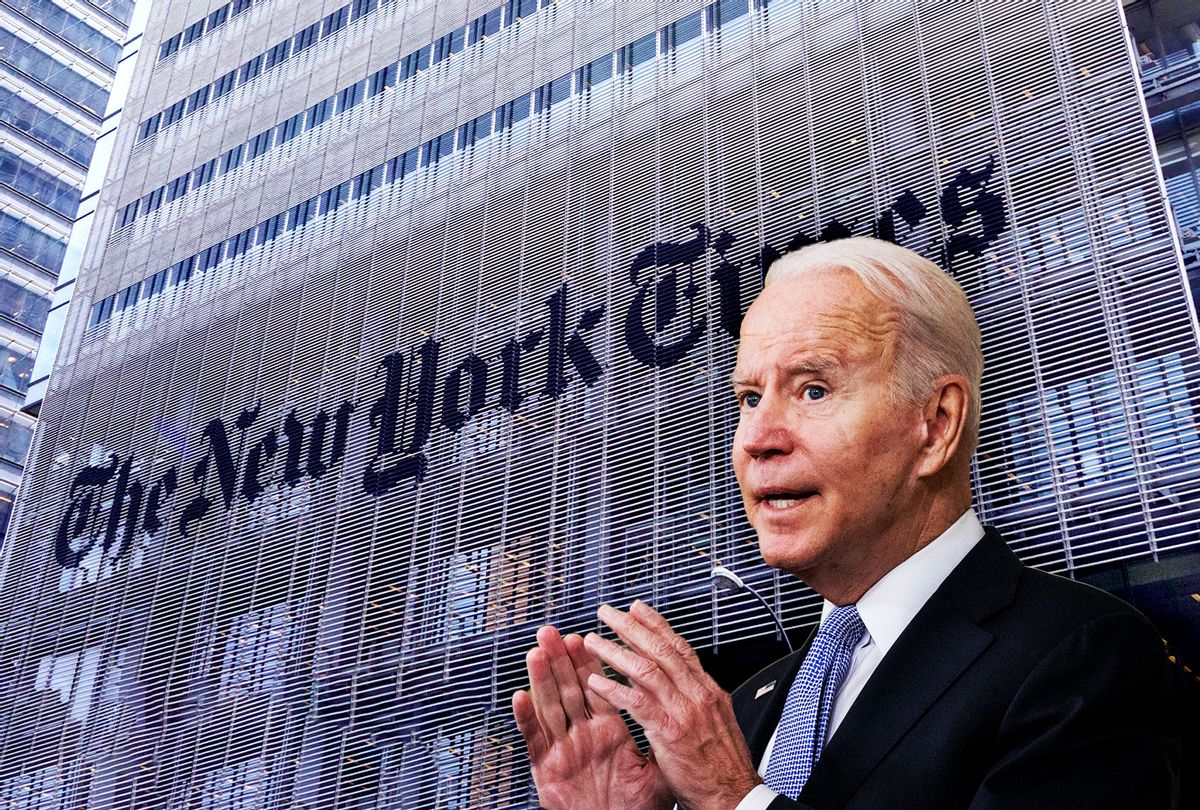
A few days after the Nov. 2 election, the New York Times published a vehement editorial calling for the Democratic Party to adopt "moderate" positions and avoid seeking "progressive policies at the expense of bipartisan ideas." It was a statement by the Times editorial board, which the newspaper describes as "a group of opinion journalists whose views are informed by expertise, research, debate and certain longstanding values."
The editorial certainly reflected "longstanding values" — since the Times has recycled them for decades in its relentless attacks on the progressive wing of the Democratic Party. Here's our attempt to translate the Times' sometimes baffling or misleading language and decode what it's really saying.
- The Times editorial board began its polemic by calling for the party to "return" to "moderate policies."
Translation: Stick to corporate-friendly policies of the sort that we applauded during 16 years of the Clinton and Obama presidencies.
RELATED: Democrats can win the culture wars — but they have to take on the fight early and often
- While scolding "a national Democratic Party that talks up progressive policies at the expense of bipartisan ideas," the editorial warned against "becoming a marginal Democratic Party appealing only to the left."
Translation: The Biden administration should reach across the aisle even more solicitously to the leadership of an obstructionist, largely racist, largely climate-change-denying, Trump-cultish Republican Party.
- The election results "are a sign that significant parts of the electorate are feeling leery of a sharp leftward push in the party, including on priorities like Build Back Better, which have some strong provisions and some discretionary ones driving up the price tag."
Translation: Although poll after poll shows that nearly all elements the Build Back Better agenda are popular with the broad public — especially increased taxation on wealthy and corporate elites to pay for it — we need to characterize the plan as part of "a sharp leftward push."
Want a daily wrap-up of all the news and commentary Salon has to offer? Subscribe to our morning newsletter, Crash Course.
- "The concerns of more centrist Americans about a rush to spend taxpayer money, a rush to grow the government, should not be dismissed."
Translation: While we don't object to the ongoing "rush to spend taxpayer money" on the military, and we did not editorialize against the bloated Pentagon budget, we oppose efforts to "grow the government" too much for such purposes as health care, child care, education, housing and mitigating the climate crisis.
- "Mr. Biden did not win the Democratic primary because he promised a progressive revolution. There were plenty of other candidates doing that. He captured the nomination — and the presidency — because he promised an exhausted nation a return to sanity, decency and competence."
Translation: No need to fret about the anti-democratic power of great wealth and corporate monopolies. We liked the status quo before the Trump presidency, and that's more or less what we want now.
- "'Nobody elected him to be F.D.R.,' Representative Abigail Spanberger, a moderate Democrat from Virginia, told the Times after Tuesday's drubbing."
Translation: Spanberger, a former CIA case officer and current member of the corporate-friendly Blue Dog Coalition in Congress, is our kind of Democrat.
- "Democrats should work to implement policies to help the American people."
Translation: Democrats should work to implement policies to help the American people — but not go overboard by helping them too much. We sometimes write editorials bemoaning the vast income inequality in this country, but we don't actually want the government to do much of anything to reduce it.
- "Congress should focus on what is possible, not what would be possible if Joe Manchin, Kyrsten Sinema and — frankly — a host of lesser-known Democratic moderates who haven't had to vote on policies they might oppose were not in office."
Translation: We editorialize about social justice, but we don't want structural changes and substantial new government policies that could bring it much closer. We editorialize about the climate crisis, but not in favor of government actions anywhere near commensurate with the crisis. Our type of tepid liberalism is an approach that won't be a bottom-line threat to the Times owners and big advertisers — and won't diminish the leverage and holdings of wealthy elites, including New York Times Company chairman A.G. Sulzberger and the company's board of directors. We want change, but not too much!
- "Democrats agree about far more than they disagree about. But it doesn't look that way to voters after months and months of intraparty squabbling. Time to focus on — and pass — policies with broad support."
Translation: Although progressives are fighting for programs that actually do have broad public support, we'll keep on steadfastly declaring that the truth is otherwise. Progressives should simply give up and surrender to the corporate forces we like to call "moderate."
More on the post-Trump plight of the Democratic Party:


/cloudfront-us-east-2.images.arcpublishing.com/reuters/4ZAKNKBIQRJPNJF4NS6GEYZ2HU.jpg)





